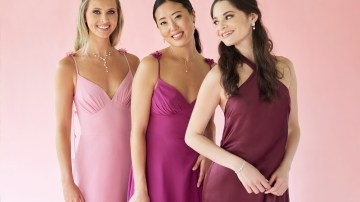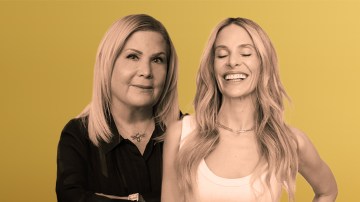To celebrate the 50th anniversary of its signature “intrecciato” leather weaving technique, Bottega Veneta did what many luxury brands do on such an occasion: It launched a star-studded campaign. Released in May, the “Craft is our Language” campaign featured celebrities familiar to fashionistas, like actress Julianne Moore and model Lauren Hutton. But it also included a lesser-known face in fashion advertising: Zadie Smith, the acclaimed British novelist and author of works like “White Teeth” and “The Fraud.”
Smith is in good company in 2025, however. Ten years after literary icon Joan Didion appeared in a Phoebe Philo-era Céline campaign, writers are getting their due in fashion.
In January, writer Patrick Radden Keefe, whose 2018 book “Say Nothing” was adapted into a 2024 FX series, modeled for J. Crew. Ottessa Moshfegh, author of the bestselling “My Year of Rest and Relaxation” and “Eileen,” which was adapted into a 2023 film starring Anne Hathaway, penned a series of short stories for Prada’s Spring/Summer 2025 campaign featuring Carey Mulligan. Designer and “Cyberfeminism Index” writer Mindy Seu modeled for J.W. Anderson’s Spring/Summer 2025 collection.
Like athletes, who have also been receiving increased attention from beauty and fashion brands, authors allow brands to connect with culture in a way that goes beyond a standard model.
“Brands are looking to occupy space in our heads, in the public arena, and actually deploy people who are outside the normal remit, who aren’t models,” said Anna Murphy, fashion director of The Times and author of “Destination Fabulous: Finding your way to the best you yet.” “Certain brands are looking to burnish their intellectual credentials. They are looking to appeal to a woman or man who has read Zadie Smith, and also wants a really amazing pair of shoes.”
Just as the likes of actors and musicians have become standard faces in fashion thanks to the likes of Anna Wintour using celebrities for Vogue covers, literature represents another way for luxury fashion to remain relevant.
“When a brand chooses an author for a campaign, it’s a sign that luxury alone isn’t enough anymore,” said Christopher Morency, chief brand officer of agency group Dogma and founder of brand strategy firm Dot Dot Dot Partners. “I believe the traditional markers of aspiration, exclusivity, craft and high price points, have been so saturated that brands are being forced to expand into other cultural territories just to stay interesting. We’ve seen them move into art, film, music and hospitality, and now literature is being brought more fully into that mix.”
Figures like authors can give credence to brands looking to position themselves as showcasing values beyond surface level fame.
“We’ve really redefined what aspiration means. For a long time, aspiration was perhaps purely looks or celebrity,” said Cara Kamenev, global brand president of Stripes, the menopause beauty brand founded by Naomi Watts.
On Friday, Stripes launched its “Hotter than Ever” campaign, which celebrates aspirational women in midlife. As part of the campaign, Watts named women she considers personally inspiring, including writer and filmmaker Miranda July. July’s 2024 novel “All Fours” follows a woman upending her life while undergoing perimenopause. Starz acquired the rights to adapt the book into a TV series in February.
“The interesting thing with Miranda’s work was that women felt seen. They’re seeing her characters explore their desires in such an honest way, and we’re all for women feeling seen,” said Kamanev.
While the rise of AI and political attacks on libraries have raised anxieties about literacy rates, a March report from NielsenIQ showed fiction sales are on the rise across the globe. The report found double-digit growth in fiction in markets like India and Brazil, despite overall declines in non-fiction and declining fiction sales in countries like France and the U.K. The report identified BookTok, TikTok’s literary corner, as a major driver in fiction genres like romance and fantasy.
Unlike athletes, or actors and musicians for that matter, authors who have the kind of clout and style to make for a good model are a rarer find, however. And their readers may find their commercial work at odds with their literary chops. Nigerian writer Chimamanda Ngozi Adichie has worked with Dior since 2016, when her book-length essay “We Should all be Feminists” inspired a T-shirt in then-creative director Maria Grazia Chiuri’s first collection for the house. She was also named the face of British drugstore beauty brand No. 7 in 2016. A review of her 2025 novel “Dream Count” decried her fame as affecting her writing.
“It can be a risk, especially for writers who are known for being critical of capitalism or who’ve built a career on being outside the mainstream,” said Morency. “But I think people are smarter about this stuff now. If the collaboration feels thoughtful and the author still feels like themselves, it’s not necessarily a bad thing. In some cases, it can even open up new audiences for their work and maybe challenge the idea that intellectualism and commerce have to be at odds.”
Didion stirred up unease for using her literary prowess to sell expensive sunglasses when she lent her image to Céline in 2015, but the concept of “selling out” is no longer so contentious for a generation of consumers that celebrates “getting the bag.” More authors looking to boost their profile may see an ally in fashion.
“In the U.K., there has traditionally been this uneasiness around fashion and style — and this idea that, if you take clothes seriously, then you probably don’t read proper books. … That’s sort of shifting now,” said Murphy. “We live in a visual culture. … It makes a difference if [authors] look like a bit of a superstar.”




